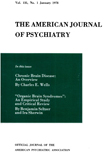PSYCHIATRIC VALUES IN A NEW METHOD OF MEDICAL EDUCATION
Abstract
An experiment in medical education at the University of Pennsylvania Medical School has been described, namely, "The Family Health Advisor Service."
This has become another educational device, which facilitates learning through the implementation of motivation by personal contact with medical and family problems early in the medical curricula, and the encouragement of maturation through the development of responsibility.
Students become Family Health Advisors on admission, and remain so throughout the 4 years of medical school work. During this period every sort of problem comes up in connection with the health of the individual members of the family—the treatment of a pregnant mother with syphilis, the diagnosis of measles and the community resources for supplying preventive inoculations of globulin, the advisability of an operation, enuresis, or helping a man of 82 to meet the anxieties of old age.
The student has experience in interpreting the doctors and hospital to the patient, and the patient and his family to the doctors and hospital.
Educationally this course has supplied practical, vivid, and important motivation for learning. It affords one of the best methods of teaching, viz., contact with actual situations. There is the challenge of human problems as well as disease. There is participation in actual work, not just laboratory exercises.
As an introduction to psychiatry, it has great value. It is a laboratory course in human relations, in which the student is a responsible participant. He experiences medical problems not as isolated disease entities, but as suffering people with feelings, whose troubles—physical and otherwise—are affected by family relationships and the impact of social and economic factors. He learns that his own attitudes and feelings are helpful or hindering in his effectiveness with patients. He learns that there is an objective, therapeutic approach to personal, emotional, familial, and sociological aspects of medical care. Furthermore, the student becomes aware of the need painstakingly to search for and understand the driving forces of patients' feelings. The therapeutic value of discussion and interpretation becomes evident as does also the healing value of human interest. By means of the Family Advisor Service the student is introduced to the field of psychiatry not as mental disease but, in the natural setting of the home, as a study of emotions, relationships, and motivations and their effect on medical disease and on human happiness and effectiveness. Thus the student is offered experience in the broad and basic aspects of psychiatry—where medicine, public health, social work, and psychiatry have common ground.
Access content
To read the fulltext, please use one of the options below to sign in or purchase access.- Personal login
- Institutional Login
- Sign in via OpenAthens
- Register for access
-
Please login/register if you wish to pair your device and check access availability.
Not a subscriber?
PsychiatryOnline subscription options offer access to the DSM-5 library, books, journals, CME, and patient resources. This all-in-one virtual library provides psychiatrists and mental health professionals with key resources for diagnosis, treatment, research, and professional development.
Need more help? PsychiatryOnline Customer Service may be reached by emailing [email protected] or by calling 800-368-5777 (in the U.S.) or 703-907-7322 (outside the U.S.).



